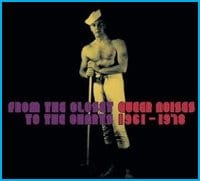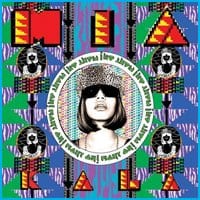How did I miss this one? While going on a jaunt to my fave neighbourhood music shop recently to take my usual weekly gander at all the Tuesday releases and to buy the new MIA, I came across a glorious compilation that was quietly released in early 2006. What kind of gay would I be not to share this with my Xtra readers?
From the Closet to the Charts, Queer Noises 1961-’78 is a truly mind-blowing compilation of overlooked queer pop songs, lovingly put together by British music writer (and Joe Meek obsessive) Jon Savage.
It starts with vaudeville-styled club routines with drag queens (or just bitchy effeminate voices), gets into ’60s pop and ’70s soul and ends smartly with what is considered the first international hit by an out performer — Sylvester’s 1978 hit “You Make Me Feel (Mighty Real).”
There are a few well-known bands included like The Kinks and their sitar-heavy “See My Friend” and The Ramones with “53rd and 3rd.” The best of these has to be a disco salsa ditty “Ain’t Nobody Straight in LA” by The Miracle’s (after Smokey Robinson). The lyrics are hilarious and very gay-positive as the boys go to “a bad place on Hollywood Boulevard” to check out the finest ladies. They sing, “Homosexuality is a part of society/ I guess that they need some more variety.”
“Do You Come Here Often?” a 1962 B-side produced by gay dude Joe Meek and performed by The Tornados, is an amazing find. It’s a cheesy organ instrumental but near the end it’s interrupted by the dialogue of two fellows in the toilets of a gay club. They’re campy little cruising bitches.
“See you down at the dilly.”
“Not if I see you first, you won’t.”
Polly Perkin’s 1973 song “Coochy Coo” is a bluesy rocker where she sings, “I’m strokin’ and I’m broken/ My mouth is hangin’ open.” Perkin was an out lesbian and the BBC banned the song. Her sleeve notes on the single read, “Liberation for women means society crumbling, marriage ruined, children left to get on with their own scenes, men losing their hold on the purse strings and bedclothes, women fancying other women.” Amazing!
There are just too many great “bad” songs here. Byrd E Bath and Rodney Dangerfield’s “Florence of Arabia,” B Bubba’s “I’d Rather Fight than Swish” and Mr Jean Frederick’s “Nobody Loves a Fairy When She’s 40” will make you laugh, cringe and admire all at once. Zebedy’s “The Man I Love” is just too sweet for words. And Rod McKuen’s beatnik light beaut “Eros” had me in stitches. Love McKuen.
Harrison Kennedy’s 1972 song “Closet Queen” is a breathtaking piece of soul funk goodness. “Closet Queen you’re alright/ You know what I mean/ Closet Queen step into the light/ Where you can be seen.”
My favourite — and the inspiration for Savage putting this compilation together — is The Brothers Butch and their 1967 tune with the inspired title “Kay Why.” The song sounds like the Beatles on a rockabilly strut.
“Oh George, isn’t it nice having a group backing us?”
“You always were greedy, Clarence.”
Then the queenie boys sing endless entendres. “Kay, why don’t you bring out the best in me?/ Why did you have to make a mess of me?/ Why did you slip through my fingers?/ Ooo.”
This album is an eye-opener, a dazzling (and sometimes goofy) historical artifact from our past. Every gay and lesbian should listen to it before they die. It’s that important. Seriously.
The new MIA is just one fucking amazing record. The girl just throws down beats like nobody’s business. Her new album Kala is the best dance album I’ve heard all year. Like her debut Arular, the sounds literally fly at you and assault your senses as Maya Arulpragasam raps and sings her smart, witty, thought-provoking wordplay. This time she seems to be experimenting more (if that’s even possible) with mixing cultural sounds. It’s a bit punkier and looser — just listen to the Bollywood/ Boney M disco ball razzamatazz intro to “Jimmy.”
“Bird Flu” is hellishly good. Steel drums have the intensity of Jimmy Page guitar wailing as Arulpragasam raps and wails through weird sped-up voices and birdcalls. “Boyz” is one killer track. It’s as extravagant and fierce as a pop tune can get. You never want it to end. Tribal drums, horns and girl chants: “How many no money boyz are crazy?/ How many boyz are raw?/ How many no money boyz are rowdy?/ How many start a war?”
Coming from a female voice, it’s a powerful tune and one of the sexiest. Dichotomy on the dancefloor.
Her music is truly inspired by the world. The songs each have unique cultural bits and bites that seem so shockingly new but somehow very familiar. Maybe living in the fabulous multicultural diversity that is Toronto, Kala speaks to me fully.
It’s like walking in Little India or Kensington, smelling all the different foods, spices, perfumes. Seeing bright magenta saris with gold embroidery flickering in the sun, dreadlocks blowing in the wind, skinny jeans on skinny girls and various languages connecting and playing together. It all seems good in the world. Then you go home and watch CNN and the world seems to be ending tomorrow. “No future” screamed The Sex Pistols. Kala feels like home. It’s a world of troubles in a city of dreams.


 Why you can trust Xtra
Why you can trust Xtra


